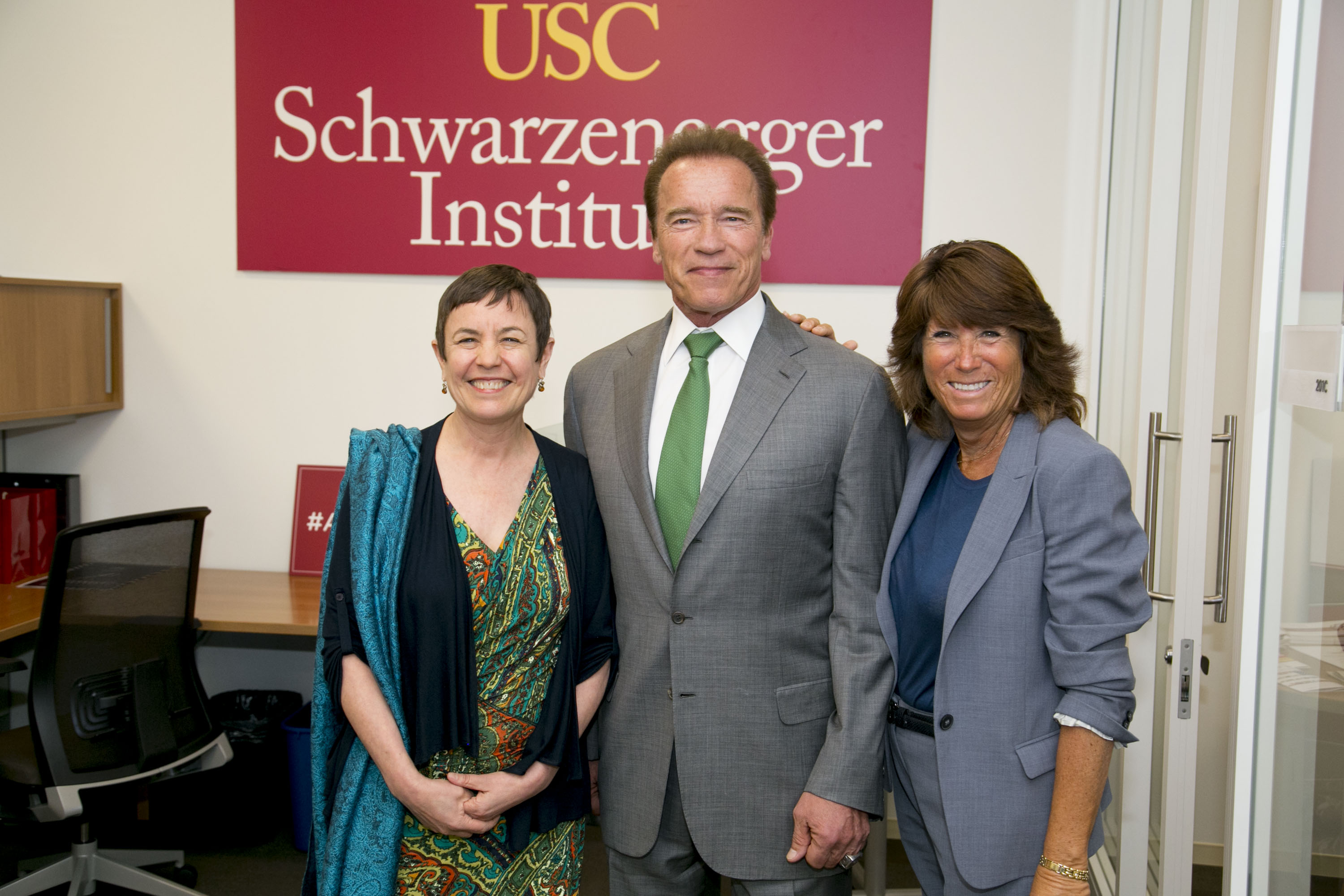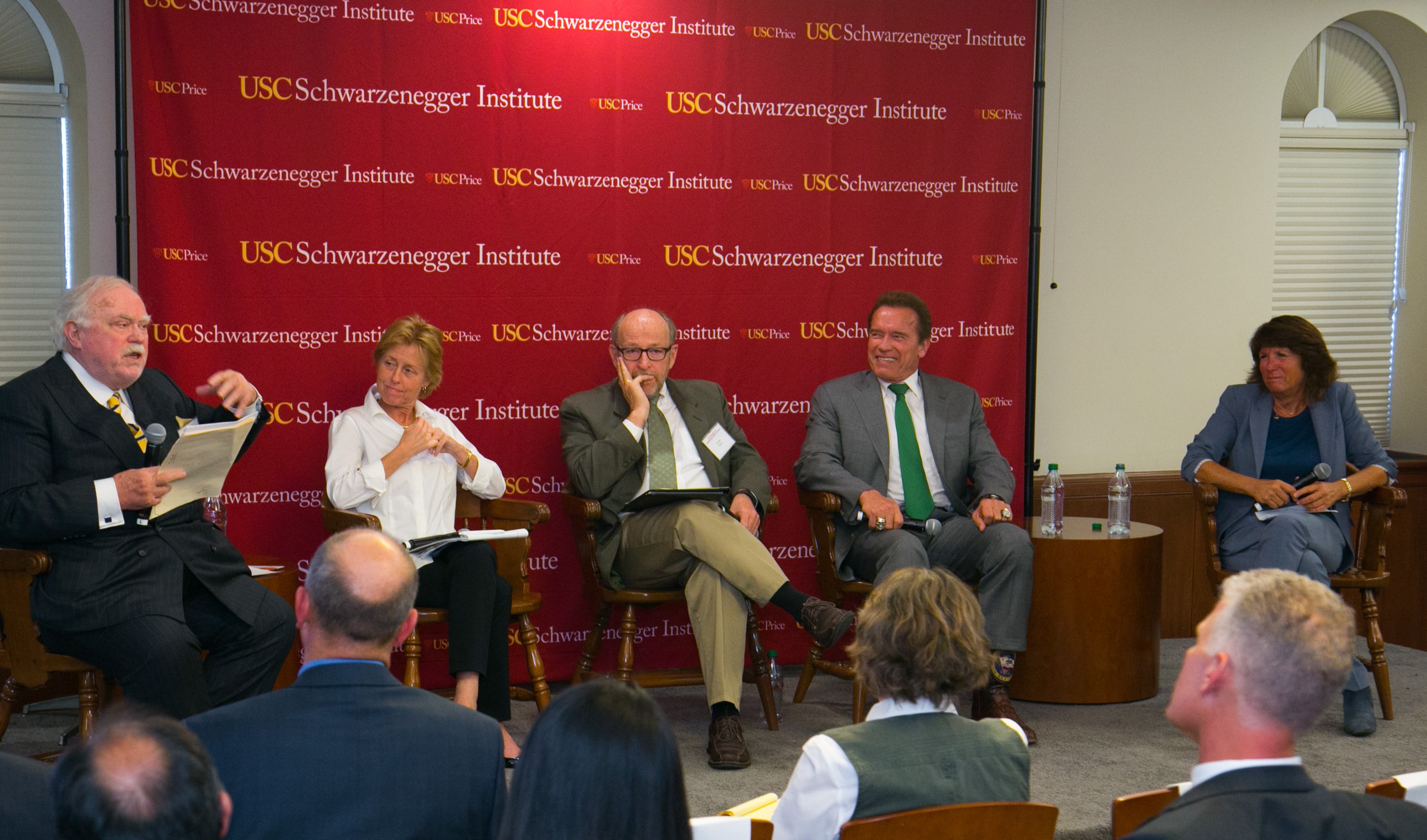Arnold Schwarzenegger called for the implementation of long-term solutions to solve the state’s water issues and put an end to the chronic drought cycle at a forum hosted on April 27 by the USC Schwarzenegger Institute and the Public Policy Institute of California.
With California in the fourth year of a record drought that resulted in Gov. Jerry Brown ordering mandatory water restrictions earlier this month for the first time in the state’s history, an all-star group of state leaders including government, agriculture, environment, business and academia, gathered at USC for a timely discussion titled “The New Reality: Addressing California’s Water Challenge.”
“Our current problem, in my opinion, is not the crisis on water,” said Schwarzenegger, Governor Downey Professor of State and Global Policy at USC. “It is the crisis of vision and commitment to long-term planning. Too often politicians cannot or do not look beyond the current crisis. It is human nature; we look for Band-Aids instead of cures.”
Overhauling the system
Schwarzenegger noted the cyclical and predictable nature of drought in the area. Over the past 100 years, Southern California has averaged 14 inches of rain. Some years it will be significantly more and others barely any at all, but rainfall totals average out at the same level as a century ago. When things are bad, there will be short-term policies and incentives, but too often they are abandoned at the first sign of rainfall.
Dean Jack H. Knott of the USC Price School of Public Policy, in which the USC Schwarzenegger Institute is housed, spotlighted Schwarzenegger’s efforts toward overhauling the state’s water system in his introductory remarks.
“When Arnold was governor, he worked closely with state lawmakers on this very issue, and in 2008 he successfully crafted a comprehensive water agreement which has led to more reliable water supplies, the monitoring of groundwater levels, improved conservations and a crackdown on illegal water diversions,” Knott said. “Gov. Schwarzenegger was on this issue and has been engaged in this issue a long time, and he cares a great deal about it.”
The big picture
In setting the stage for the discussion with a big-picture look at the problem, Ellen Hanak, senior fellow and director at the Public Policy Institute of California’s Water Policy Center, expressed the need for an all-of-the-above strategy to create a sustainable water future in the state. This includes conservation, capturing rain water, enhancing water storage, recycled water plants, and modernizing infrastructure and regulations.
Bonnie Reiss, global director at the USC Schwarzenegger Institute, declared that there’s no single issue like water that impacts everything on the planet and yet most people in the United States and Southern California take it for granted.
“We turn the tap, water comes out,” Reiss said. “We don’t have the psychology of it being as precious a resource as it really is.”
The forum offered three panels addressing the California water challenge with a goal of understanding the problem and analyzing possible solutions to create a vision that will be effective 50 years from now.
Optimistic statistics
The first panel featured Vito Chiesa, president of the California State Association of Counties; Marcie Edwards, general manager for the Los Angeles Department of Water and Power; Felicia Marcus, chair of the State Water Resource Control Board; and Tim Quinn, director for the Association of California Water Agencies. Mark Baldassare, president and CEO for the Public Policy Institute of California served as moderator.
Edwards offered optimistic statistics showing that conservation is happening in Los Angeles. Since 2007, water use is down 22 percent in the county. Water use in LA has remained the same over the past 45 years despite a 1 million increase in people.
“There’s still a heavy proliferation of ornamental landscaping in this city by businesses, some universities and residential,” Edwards said. “It’s a large untapped market for conservation. People don’t realize how much we can do.”
Felicia Marcus, who is responsible for implementing the Governor’s statewide water restrictions, said “this is an issue of everyone getting prepared for the long haul”.
Looking ahead
The next two panels looked toward the future. Part 1 featured Juliet Christian-Smith, a climate scientist with Union of Concerned Scientists; Danny Curtin, board member of the California Water Commission; University of California, Irvine Professor James Famiglietti, a senior water scientist at the NASA Jet Propulsion Laboratory; and Daniel Sumner, director of the University of California Agricultural Issues Center at the University of California, Davis. Val Zavala, vice president of news and public affairs at KCET, served as moderator.
In a future with more rain and less snow due to global warming, rainwater capture will become increasingly important. It’s also an area with plenty of room for improvement, as only about one-quarter of rain water in Southern California is kept. Old infrastructure is designed to push it out into the ocean.
“We treat rainwater like an outlaw,” Famiglietti said. “We capture it and run it out of town.” He warned that storage alone is not a solution, as groundwater has continuously been depleted, saying that we are “deficit spending” our water, and must focus on how to replenish our groundwater.
Famiglietti said that the Sustainable Groundwater Management Act that was passed into law last year has the potential to be revolutionary. It will carve up the state into a number of groundwater sustainability agencies that will be tasked to come up with a sustainability plan in the next five years.
Christian-Smith said she would like to see a public goods charge for water like there is with electricity, creating a slight increase in water rates that would fund research and innovation for the sector.
The final panel, moderated by Reiss, featured Schwarzenegger; University Professor Kevin Starr; Lester Snow, executive director of the California Water Foundation; and Susan Kennedy, president of Advanced Microgrid Solutions and former chief of staff for Gov. Schwarzenegger.
‘Mickey Mouse money’
Kennedy named the development of infrastructure as the most important single aspect for California’s water future. A $7 billion Water Bond was approved by voters last year for infrastructure improvement, but it’s a total Schwarzenegger called “Mickey Mouse money” compared to the changes that are needed. He lamented that, unlike in the private sector, it’s difficult to get government officials in California to think big.
“How do you expect the citizens or voters of California to follow when the leadership has ADD?” Kennedy asked. “The political leadership of California chases problems like 5-year-olds on a soccer field.”
Starr indicated that part of the problem is term limits that don’t allow elected officials to build up expertise in an area. Giving a historic narrative, he explained water as a tale of three centuries. The first envisioned the region as a water-scarce Mediterranean climate. The second, the 20th century, emphasis was placed on engineering with billions spent on federal, state and local water delivery systems. Now, the third century needs to employ technology and a Mediterranean-oriented development.
Kennedy suggested taking a look back at California’s energy crisis of 15 years ago for examples on how to get the message across for sustainable change.
“Californians are very good with conservation,” Schwarzenegger said in his conclusion. “California is 40-percent more energy efficient than the rest of the U.S. That shows how great Californians are and what great team players Californians are if you ask for their help and include them. I think people will get the message that they have to cut back on water.”
The USC Schwarzenegger Institute gives students a prominent place at its events. This discussion was attended by 20 students from USC Price Adjunct Associate Professor Todd Gish’s course on sustainable communities. Also USC students from the Graduate Student Association, The Environmental Student Assembly and the Academy for Polymathic Study attended.
“This forum was a nice reinforcement that what we’ve covered in class actually matters,” said Austin Tutorow, a sophomore in Gish’s class majoring in public policy. “Hearing from the panelists, with the research they’ve done, was hugely important for us students who will someday make decisions on what we can do to change what is frankly a crisis in California.”
Lester Snow, one of the State’s leading water experts, said that if California is going to become water sustainable into the next century then a broad based coalition will need to drive the change.
Reiss wrapped up committing the Institute to play a leadership role on this coalition, taking an “all of the above” approach to solutions, and understanding “we are all in this together”.



